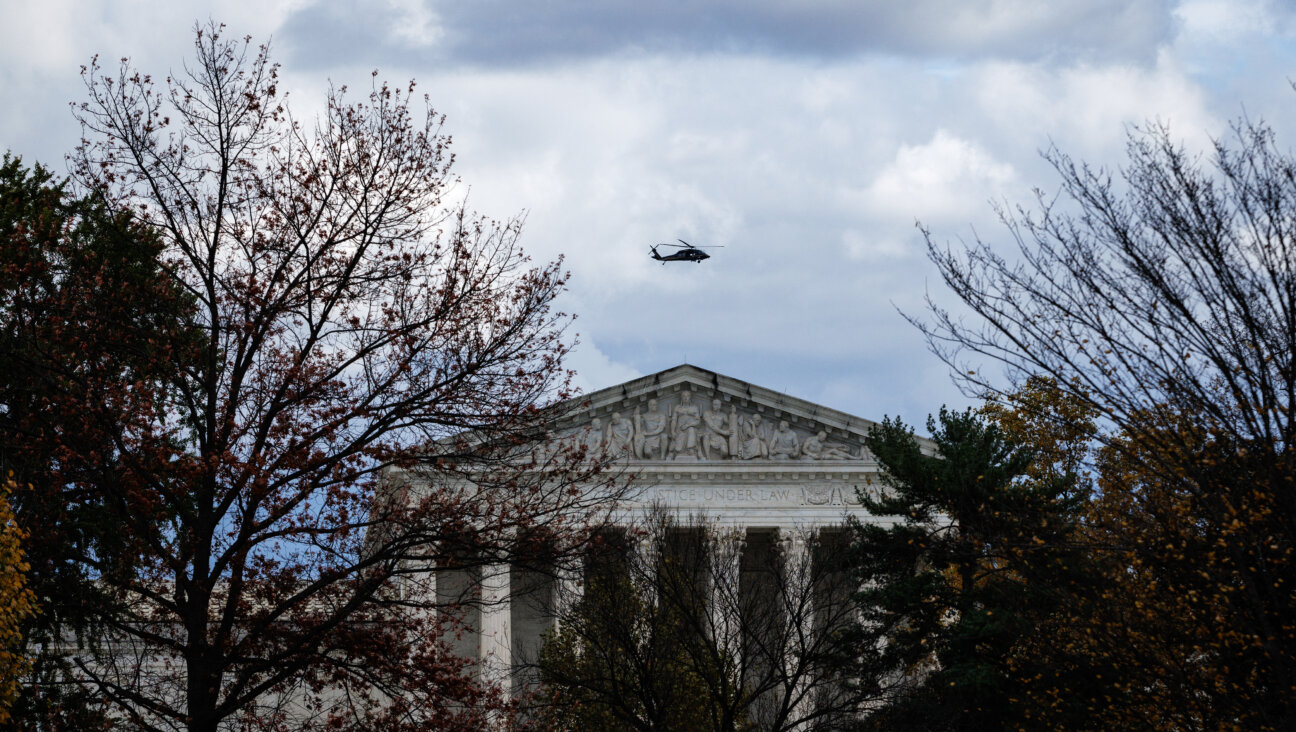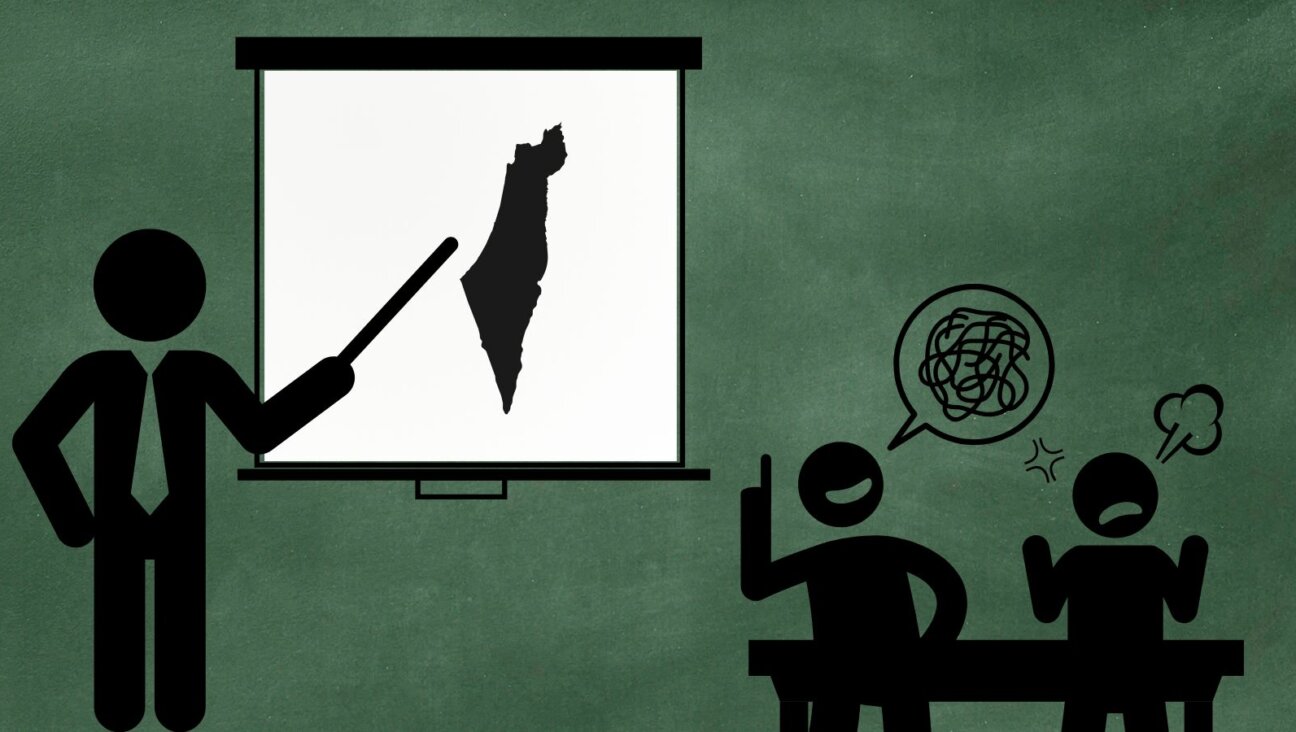New French History Offers a Ray of Hope for Jewish-Muslim Relations

Image by Getty Images
The Burdens of Brotherhood: Jews and Muslims From North Africa to France
By Ethan B. Katz
Harvard University Press
480 pages, $35
In August 1961, two Algerian Jews, Simon Zouaghi and Martin Benisti, disembarked in Marseilles. The two men — one a butcher, the other a cook — had uprooted themselves and their loved ones from the bloody chaos of the French-Algerian War with the goal of resettling in France. With large families and meager resources, it is natural that they found their way to a government bureau that would provide assistance and advice.
Far less natural, perhaps, is that the government bureau was the Service of Muslim Affairs.
Why, then, was this natural 50 years ago? The historian Ethan Katz, who recounts this story, explores this question in his striking book “The Burdens of Brotherhood.” Benisti and Zouaghi, it so happens, had lost neither their way nor their minds: Nearly 1,000 other Algerian Jews visited this office during the final months of the war. While these men are but a drop in the bucket of the nearly 130,000 Algerian Jews who left for France following Algeria’s independence in 1962, they form the richest and most revealing of drops. It reflects a stunningly complex history that unsettles many of our certitudes about Muslim-Jewish relations.
Katz does not revisit the so-called “Golden Age” of Muslim and Jewish relations — threading through the Middle Ages and stretching to Cordoba from Baghdad— over whose nature historians have long battled. He instead opens up a new front in the historiographical war, one limited to late 19th- and 20th-century France. Over the past 150 years, Katz argues, the shared history of Muslims, Jews and the French has deeply shaped, and often scarred, all three parties to this triangular and peculiar relationship. But as Katz reveals, it is a history that need not have turned out the way it did.
The very logic of the ménage à trois, whether between three individuals or three communities, is that one party will usually be left in the cold. Ever since North Africa fell under French imperial control, this has been the fate reserved for the region’s Muslims. In 1870, once France had absorbed Algeria lock, stock and barrel, it bestowed French citizenship on the nearly 40,000 Jews who had lived there for centuries. By the time trenches stretching from the English Channel to Switzerland had been dug, setting the stage for World War I, the size of the Algerian Jewish community had nearly tripled, and their menfolk were eager to prove their attachment to la patrie.
As for Algerian Muslims, not so much. Who could blame them? In 1870 they were not only kept off the bus, but also were effectively thrown under it with the passage, in 1881, of the code de l’indigénat. A set of laws that created penalties aimed specifically at Arabs and Berbers, the code also enabled the government to expropriate land and distribute it among European colonists. This code drove Georges Clemenceau, one of France’s great republican heroes — and defender of Alfred Dreyfus — to denounce it as legalized slavery, theft and torture in the name of civilization. “This is not law,” he thundered in the National Assembly, “but instead it’s negation!”
Yet, despite these legal and civic distinctions between Algerian Jews and Muslims, their many bonds of complicity survived the war. Many Jews, especially those from modest backgrounds —artisans, shopkeepers and clerks — had more in common with their Muslim neighbors than they did with the increasingly “Frenchified” Jewish elite in Algiers, Oran and Constantine. They shared not only certain styles of dress, cuisine and music — it was not unusual for Jewish singers to headline Arab musical groups — but even a language: Many Algerian Jews spoke a dialect of Arabic. Moreover, during WWI, Algerian Jews and Muslims frequently served together, and too often died together, in the same battalions. (In French military cemeteries, one can glimpse the Star of David marking a Jewish grave while the Muslim crescent rises above the neighboring grave.)
Through the interwar period, Algeria’s Jews and Muslims continued to define themselves, to use Katz’s terminology, in a situational rather than a definitional manner. In other words, individual and collective identity had not yet frozen into a single type, but instead remained fluid. Given a particular context, both Algerian Jews and Muslims could, and did, call upon a common and capacious store of cultural references and rituals to make sense of their world and themselves. They often shared neighborhoods not only in Algeria, but also in Paris and Marseilles, mingling in coffee houses, grocery stores and even homes.
In the 1930s, the Algerian Jew René Gharbi opened a cafe in the Marais called the Petit Marseillais. The house specialty was couscous, and the clientele was Muslim as well as Jewish. As Gharbi’s grandson recalled: “We were on good terms. The Muslim neighbors came to our cafe, we went to theirs.”
In this relationship, however, one partner was decidedly more equal than the other. Powerful colonial and pied-noir lobbies strangled efforts to enfranchise and integrate greater numbers of Algerian Muslims — most notably, the Violette Plan, a stillborn proposal introduced by Léon Blum’s Popular Front government in 1936. Crucially, during the interwar period, Ashkenazi Jews were among the most eloquent and determined advocates of Muslim rights. Citing the sacrifices made by North African Muslims during WWI, the celebrated Dreyfusard Joseph Reinach declared, “Whoever has shed with us his blood has the right to our liberty and justice.” The International League For the Rights of Man, which was created during the Dreyfus Affair and had a sizable number of Jewish members, also argued that Muslims should be made full and equal citizens. Come 1940, however, the scales tipped dramatically in the other direction. With the advent of the anti-Semitic Vichy regime, French Jews were thrust into a legal, civil and existential position far worse than France’s Muslims had ever known. At the same time, Muslims in France, thanks to Vichy’s racial categories, found themselves enjoying the same legal status as “Aryans.” In September 1940, when the ineffable Philippe Pétain declared, “I do not differentiate among the French: Catholics, Protestants, and Muslims are all my children,” it became clear that it was the turn of French Jews to be thrown off the bus and under its wheels.
In a world that seemed like the collaboration between Lewis Carroll and Edouard Drumont, many Sephardic Jews, scrambling to survive, at times tried to pass as Muslims. Some spoke in Arabic to Vichy officials, while others traced their family trees to the soil of the Levant, claiming Muslim roots. Yet others were helped by Muslim neighbors, and in the controversial case of Paris’s Grand Mosque, its rector, Si Kaddour Benghabrit, hid several Jews from Vichy and Nazi officials. Yet others were refused help, revealing Benghabrit’s political calculations and efforts to tack resistance and collaboration. At the other extreme there were yet other Muslims, like Mohamed El-Mahdi, who, insisting that Muslim Arabs and Germans shared the same ideological and political goals, argued for active collaboration with Hitler.
Ultimately, Muslims were not much different from the rest of France: Knots of resisters and collaborators marked the two extremes of the political spectrum, with the vast majority of Muslims milling in between. For France’s Muslims, the war and occupation revealed something even more telling: France’s empire, under which they had been consistently deprived of civil and legal rights, was far more vulnerable than they had previously imagined. As for France’s Jews, there was an equally powerful lesson: The nation that had given the Jews the rights of citizenship during the Revolution was, 150 years later, capable of stripping Jews of those same rights. With such revelations begin revolutions: While Algerian Muslims increasingly turned to nationalism in postwar France, so, too, did French Jews grow increasingly receptive to Zionism. While French Jews and Muslims continued to share physical and cultural spaces, political and ideological movements were beginning to reshape and divide their worlds. A significant number of left-wing French Jews joined the Algerian National Liberation Front, while a handful of FLN moderates like Ferhat Abbas argued that Israel and an independent Algeria shared the same geopolitical aims. As the French-Algerian War grew ever more dirty and bloody, France’s Jewish university student organization, the UEJF, led protests against the bloody police repression of Muslim protesters in Paris.
In the four decades that span Algerian independence and the second intifada — an event that quickly became, as the sociologist Marc Hecker argues, “a French affair”— French Jewish and Muslim identities, once “situational,” slowly congealed into a state that is all too “definitional.” The 130,000 Algerian Jews who quit their country in 1962, as well as the tens of thousands who left Tunisia and Morocco, settled in France and pulled French Jewry away from its liberal and progressive roots. As for the hundreds of thousands of Algerian Muslims who had migrated to postwar France, their children remain betwixt and between. The slang word “beur” — an inversion of the word “Arab” — that they use to describe themselves also describes a state in which they feel no more chez soi in France than they do in Algeria.
Ultimately, in the same way that many beurs now identify with the Palestinian cause, a small but growing number of French Jews are now turning away from France and toward Israel. The massacres of French Jews by Islamist fanatics over the past three years, ranging from schoolchildren in Toulouse to shoppers at a kosher supermarket in Paris, have only hardened the communitarian and religious lines between Muslims and Jews. The time, only a few generations back, when the lives of French Jews and Muslims crossed and coexisted in so many fruitful ways now seems as fantastic as Edward Hicks’s “The Peaceable Kingdom.” But while there never existed a peaceable kingdom, is it so fantastic to believe that if there is little reason to hope, there is still no reason to despair over the future? In other words, is “definitional” the same as “deterministic”? At the end of his book, Katz rightly emphasizes the pivotal role played by contingency in the history of Jewish-Muslim relations in France. It may well be it is not the past that determines the present, but the present that determines the past. In other words, we commit what philosophers of history call the teleological fallacy — namely, the conviction that the unfolding of past events was inevitable because, well, that is how they unfolded. But this is, of course, a fallacy. Katz’s book offers not only a powerful counter-narrative to the story we now tell ourselves about Jewish-Muslim relations in France, but also a reason to hope that other narratives might still unfold.
Robert Zaretsky is a professor of history at the University of Houston and the author, most recently, of “Boswell’s Enlightenment.”
A message from our CEO & publisher Rachel Fishman Feddersen

I hope you appreciated this article. Before you go, I’d like to ask you to please support the Forward’s award-winning, nonprofit journalism during this critical time.
We’ve set a goal to raise $260,000 by December 31. That’s an ambitious goal, but one that will give us the resources we need to invest in the high quality news, opinion, analysis and cultural coverage that isn’t available anywhere else.
If you feel inspired to make an impact, now is the time to give something back. Join us as a member at your most generous level.
— Rachel Fishman Feddersen, Publisher and CEO
























